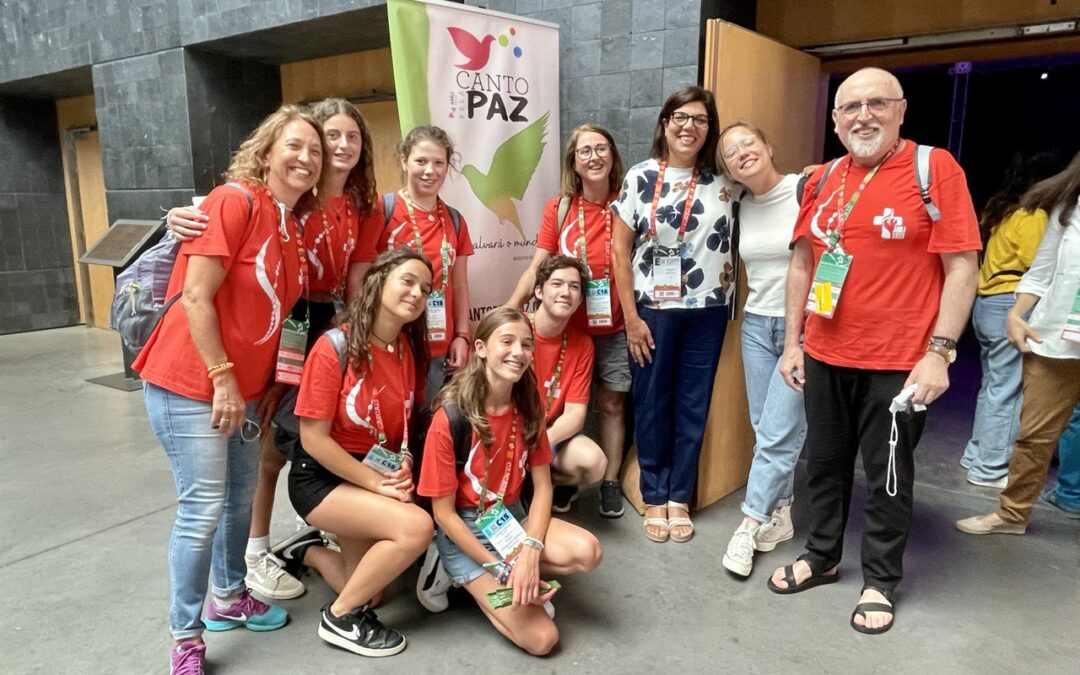
Aug 8, 2023 | Non categorizzato
These were Pope Francis’ final words as he said goodbye to the young people and all the participants at the concluding Mass of World Youth Day 2023.
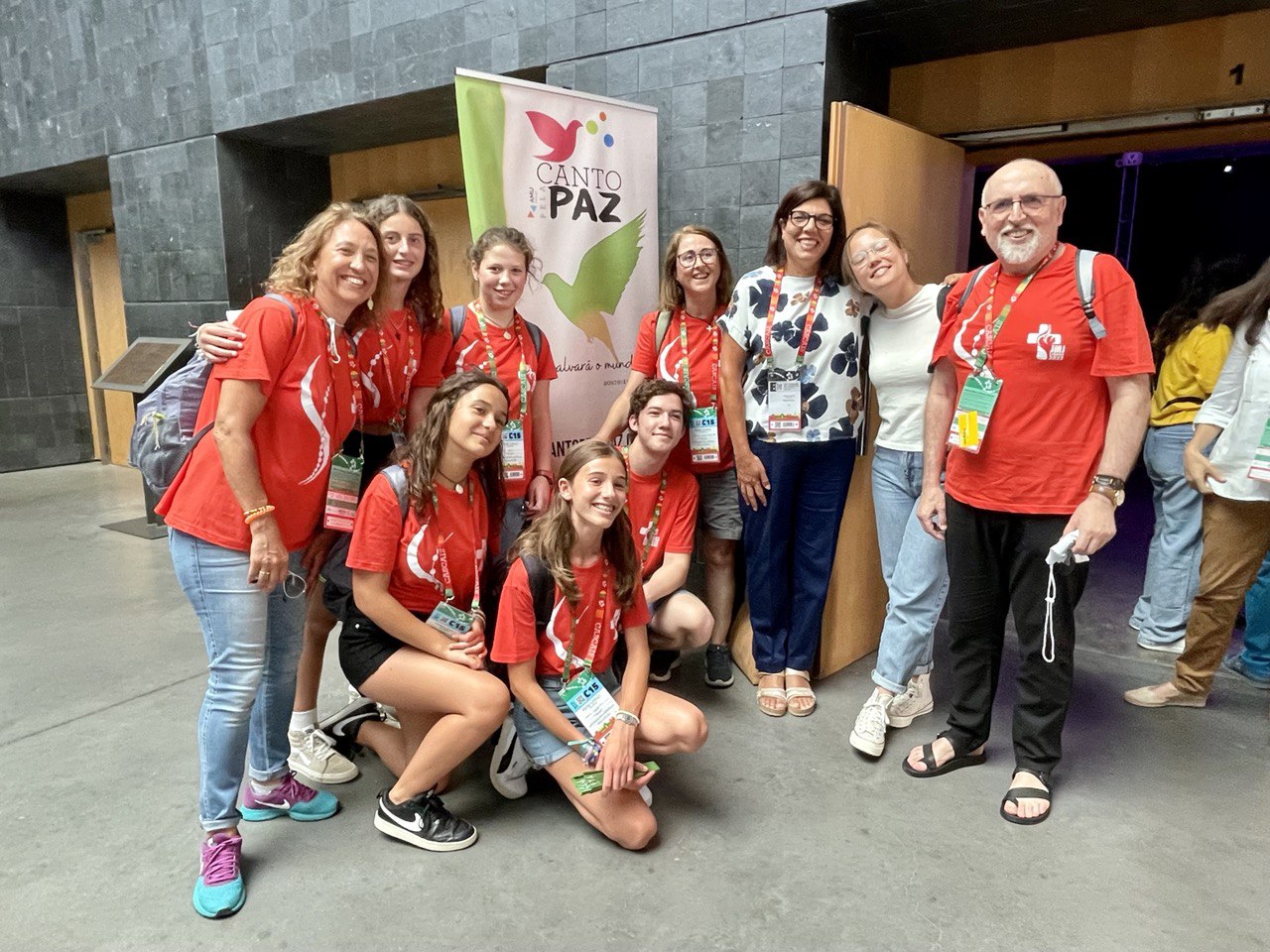 It is difficult to describe what we experienced during these unforgettable days of grace. I know it is a cliché to say that you have to experience it to understand it. But it is true! It is certainly true on this occasion. I have participated in four WYDs, the first two and the last two, and I can testify that there is something about these days that cannot be explained. A well-known Portuguese public figure, who is agnostic and a cinema lover, wrote in a newspaper article that what he contemplated on the streets of Lisbon in this scorching summer was the most beautiful film he had ever seen. It was impossible not to be uplifted by the cheerfulness and liveliness poured out in torrents by the young people who had come to the ‘city of light’ and who filled it with the other light they carried within themselves. We saw them everywhere, in the shopping malls, in the metro, on the buses, in the bars, in the parks or on the roads. They gathered in small and large groups, and were like multi-coloured, loud, talkative, multi-charismatic human rivers, with a kindliness that warmed the heart. Walking among them, I saw the inhabitants of the city; some were puzzled, some interested. If Lisbon, with its magical and indescribable beauty, was a gift for these young people, they were no less a gift for this city, which will be proud to have seen one and a half million young people come together to celebrate their faith in Christ, something previously unheard of.
It is difficult to describe what we experienced during these unforgettable days of grace. I know it is a cliché to say that you have to experience it to understand it. But it is true! It is certainly true on this occasion. I have participated in four WYDs, the first two and the last two, and I can testify that there is something about these days that cannot be explained. A well-known Portuguese public figure, who is agnostic and a cinema lover, wrote in a newspaper article that what he contemplated on the streets of Lisbon in this scorching summer was the most beautiful film he had ever seen. It was impossible not to be uplifted by the cheerfulness and liveliness poured out in torrents by the young people who had come to the ‘city of light’ and who filled it with the other light they carried within themselves. We saw them everywhere, in the shopping malls, in the metro, on the buses, in the bars, in the parks or on the roads. They gathered in small and large groups, and were like multi-coloured, loud, talkative, multi-charismatic human rivers, with a kindliness that warmed the heart. Walking among them, I saw the inhabitants of the city; some were puzzled, some interested. If Lisbon, with its magical and indescribable beauty, was a gift for these young people, they were no less a gift for this city, which will be proud to have seen one and a half million young people come together to celebrate their faith in Christ, something previously unheard of.
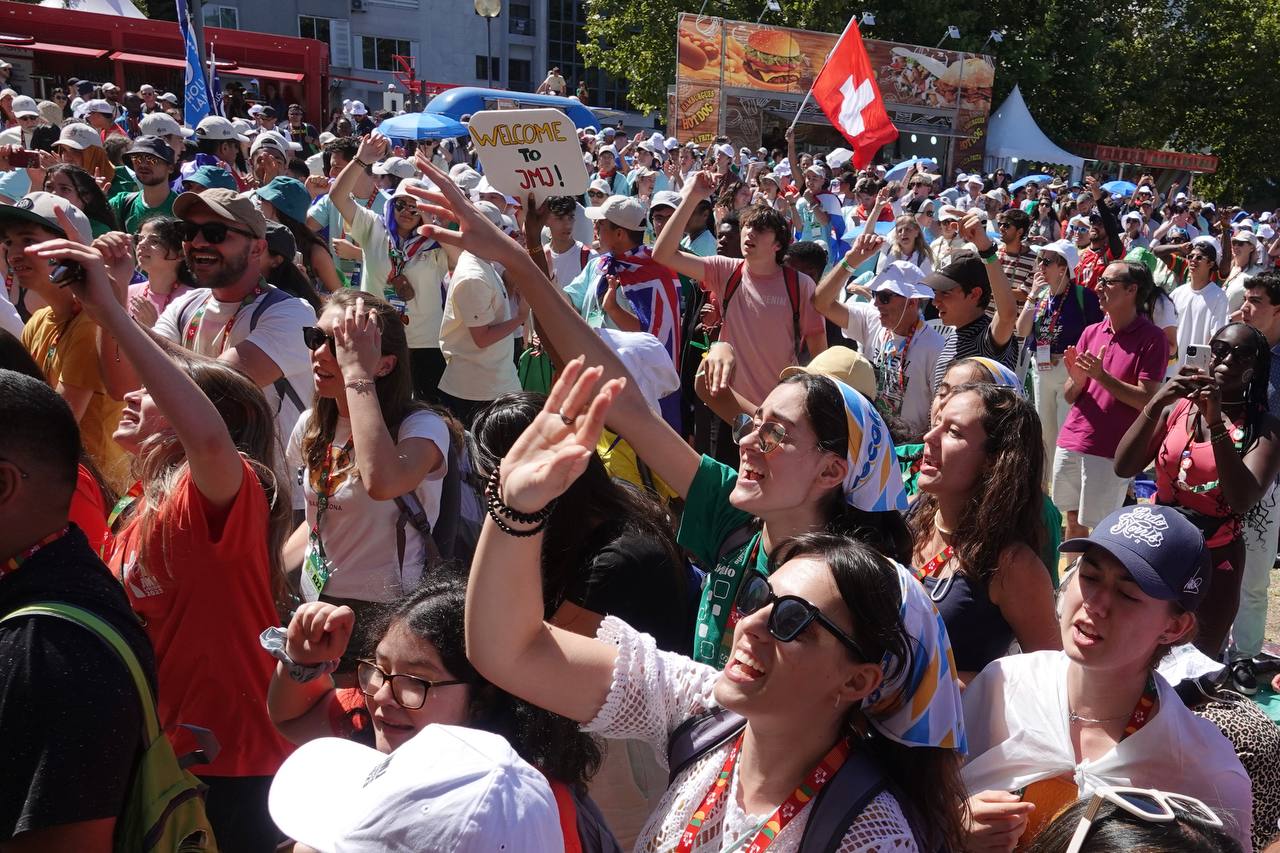 The Portuguese Church and the Dicastery for the Laity, Family and Life, the organisers of the event, together with the city and its civil authorities, did an amazing job. But there is no doubt that the prize goes to the young people. Who could have imagined this happening after three years of a serious pandemic and in the midst of an institutional crisis, such as the one the Catholic Church is going through because of abuses of various kinds?! Even though today the Spanish press gave coverage to the case of a girl with 5% visual capacity who claims to have recovered her sight in the past few days, for me the real miracle was the living faith of these young people, expressed in their own words and with a multitude of bold and even disconcerting gestures.
The Portuguese Church and the Dicastery for the Laity, Family and Life, the organisers of the event, together with the city and its civil authorities, did an amazing job. But there is no doubt that the prize goes to the young people. Who could have imagined this happening after three years of a serious pandemic and in the midst of an institutional crisis, such as the one the Catholic Church is going through because of abuses of various kinds?! Even though today the Spanish press gave coverage to the case of a girl with 5% visual capacity who claims to have recovered her sight in the past few days, for me the real miracle was the living faith of these young people, expressed in their own words and with a multitude of bold and even disconcerting gestures.
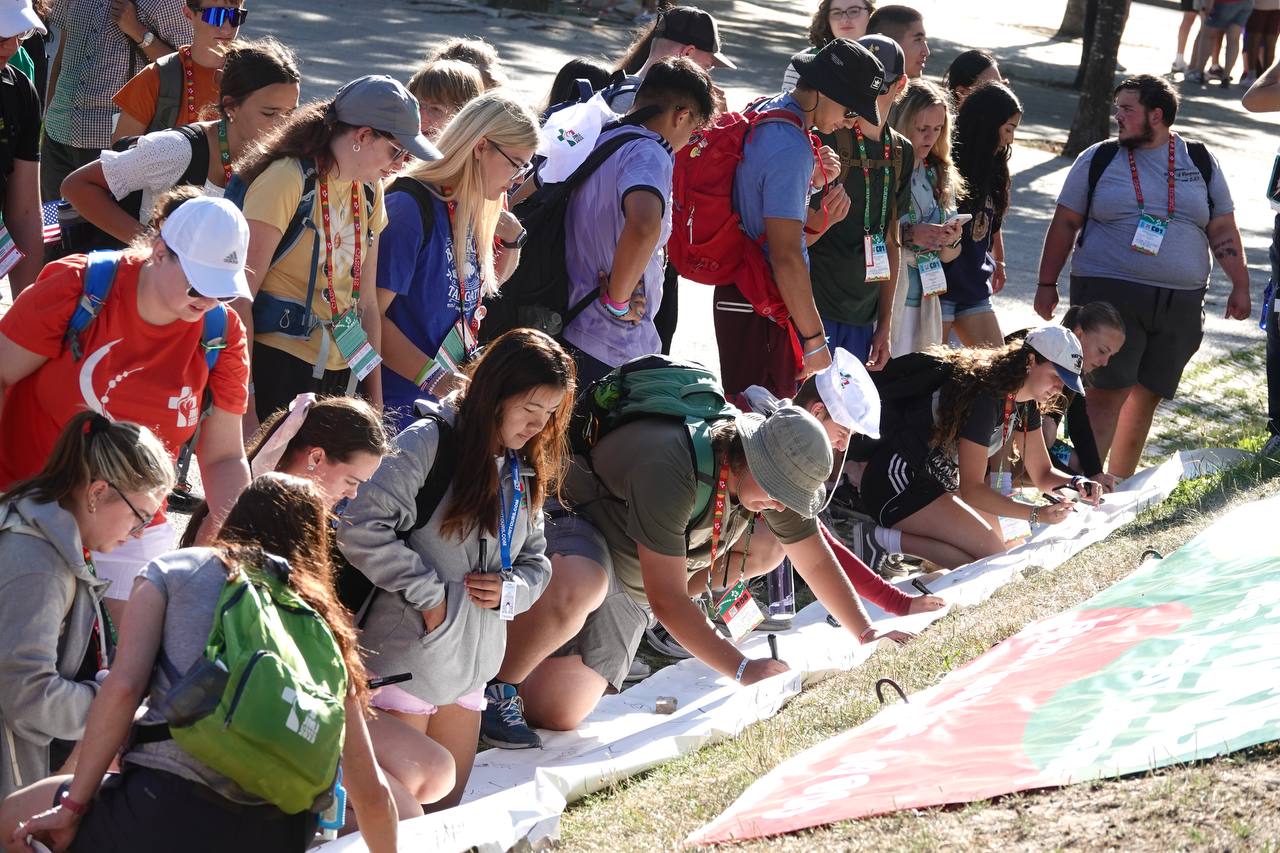 In fact, while they showed an overflowing enthusiasm by singing and dancing, the most emblematic moment – indeed the real centrepiece of the event – was once again the Eucharistic adoration at the vigil: more than a million people knelt down without anyone telling them to do so, to adore in ‘deafening’ silence the One they consider the ‘heart of the world’! It was impossible not to be moved. And at that moment, the fado given to us by the singer Carminho gave us goosebumps: ‘You are the star that guides my heart/ You are the star that has lit my path/ You are the sign that I guide destiny/ You are the star, and I am the pilgrim’. And one wonders at the power of attraction that a small host can exert on such a large crowd of young people spread over a field over three kilometres long (100 football pitches).
In fact, while they showed an overflowing enthusiasm by singing and dancing, the most emblematic moment – indeed the real centrepiece of the event – was once again the Eucharistic adoration at the vigil: more than a million people knelt down without anyone telling them to do so, to adore in ‘deafening’ silence the One they consider the ‘heart of the world’! It was impossible not to be moved. And at that moment, the fado given to us by the singer Carminho gave us goosebumps: ‘You are the star that guides my heart/ You are the star that has lit my path/ You are the sign that I guide destiny/ You are the star, and I am the pilgrim’. And one wonders at the power of attraction that a small host can exert on such a large crowd of young people spread over a field over three kilometres long (100 football pitches).
You might think that the young people who gathered in Lisbon are good people, with an orderly life, polite young people, who do not get involved with other people’s problems. Nothing could be more mistaken. An international group of young people toiled for years to come up with an artistic framework of extraordinary beauty and visual effectiveness. They constructed a huge stage, a kind of giant scaffolding on which they moved around in an ethereal manner, letting themselves fall while securely tied to ropes, and carrying the cross from side to side, up and down. The feeling of vertigo was continuous, and the choice of this approach was not accidental: at each station, with a few words of reflection and a lot of visual impact, the ‘vertigo’ that imbues the lives of young people today was crudely expressed: addictions, lack of meaning, an uncertain future, contempt for life, toxic relationships. All motifs that the cross bore, or rather, that the crucified one bore on his shoulders, to be transfigured into new life.
Of course, the key moments of this WYD, as of the previous ones, were the meetings with the Pope. Another puzzling and characteristic feature of these events: why do young people love the popes so much, regardless of their (the popes) character, be it traditional, intellectual or reformist?
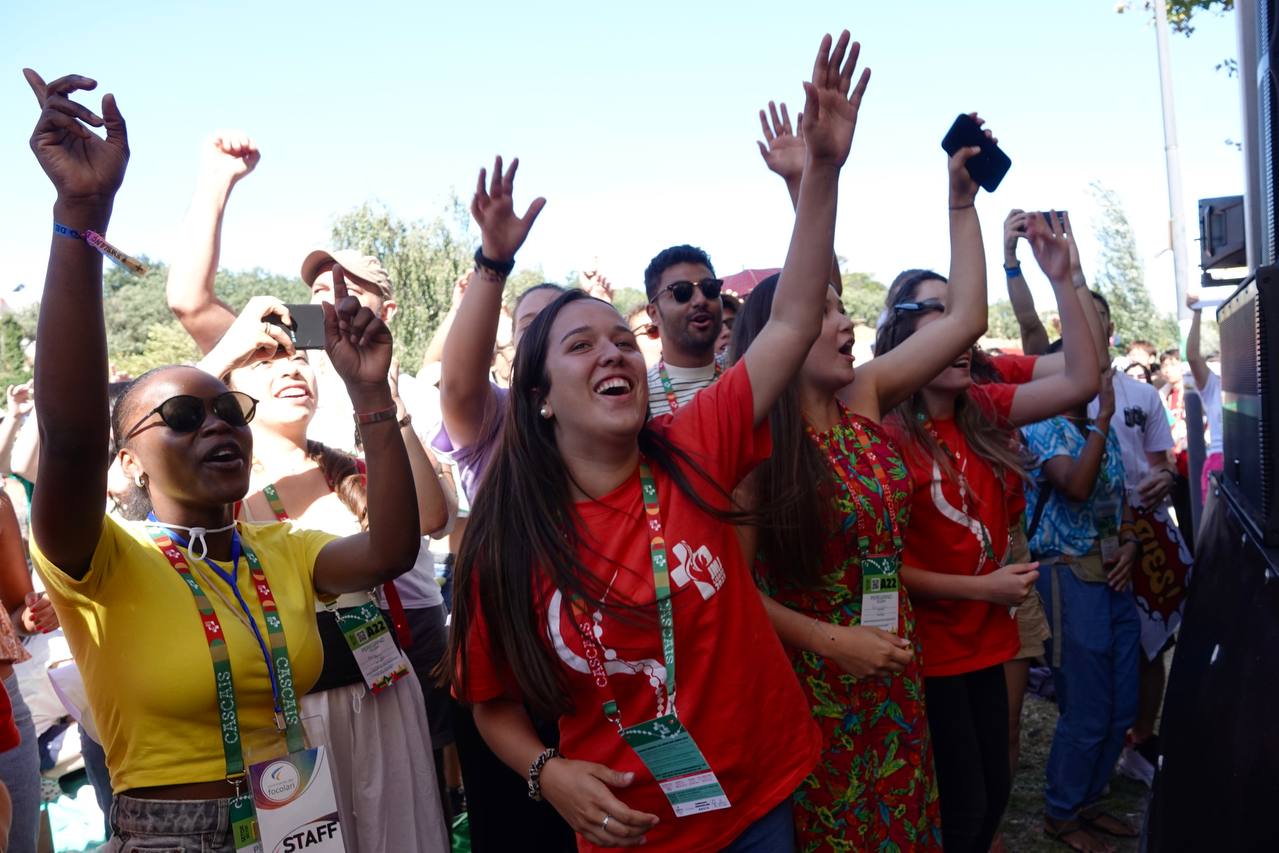 Apart from these highlights, the programme was filled with many other smaller events, but which were no less significant, such as concerts in key city locations, meetings in nationalities, sharing with people involved in the Church in parishes or associations and above all the various catecheses led by the young people themselves with bishops from different parts of the world as keynote speakers. These were all opportunities to deepen the WYD motto: Rise up.
Apart from these highlights, the programme was filled with many other smaller events, but which were no less significant, such as concerts in key city locations, meetings in nationalities, sharing with people involved in the Church in parishes or associations and above all the various catecheses led by the young people themselves with bishops from different parts of the world as keynote speakers. These were all opportunities to deepen the WYD motto: Rise up.
“Have no fear, take heart, do not be afraid!” Pope Francis seemed to be speaking to the whole Church with these words. For there is no doubt that courage is needed and in this, young people are called to be in the front line. They are the present and the future of a Church renewed by the Spirit.
A Church that, as Francis has repeated several times, desires to be a home for all, without excluding anyone, and to recover the prophetic drive that permeates it. This Church walks with new confidence, the confidence it finds in itself and beyond itself, in Jesus Christ. A Church that desires to give hospitality to all humanity in the resurrected humanity of Jesus of Nazareth, as a well-known theologian says.
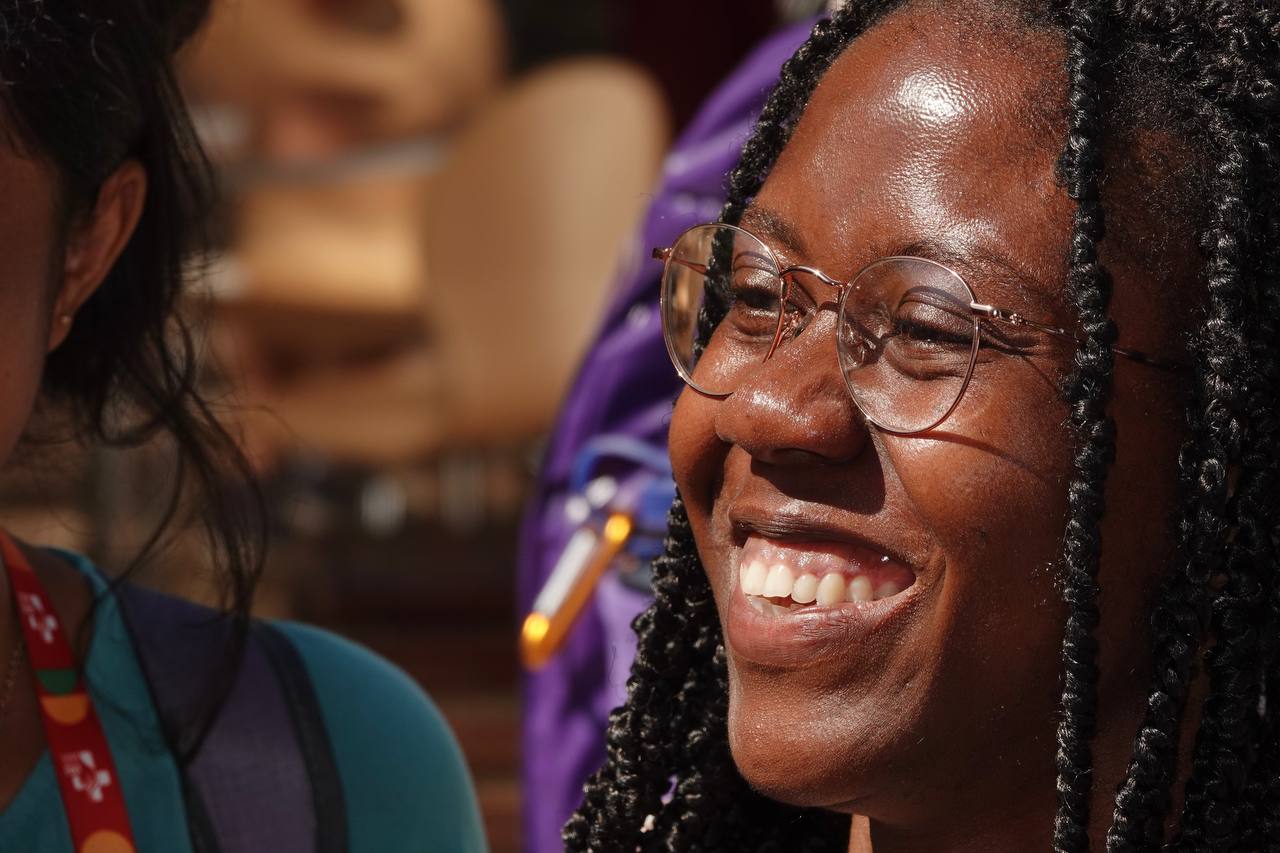 Perhaps I am too optimistic, but in these few days I have seen a young Church that has already gone a bit beyond the time of trial or is at least confident about overcoming it. The thousands and thousands of young people I met in Lisbon taught me this.
Perhaps I am too optimistic, but in these few days I have seen a young Church that has already gone a bit beyond the time of trial or is at least confident about overcoming it. The thousands and thousands of young people I met in Lisbon taught me this.
They don’t create problems; they do not become fossilised in criticism. Far from it, something (their purity, perhaps, refined in pain and uncertainty) leads them to focus on the core of faith with simple hearts. And, as the Master says, theirs is the Kingdom of Heaven (cf. Mt 5:1-12).
Three images summarise everything I want to express in this article: young people on the move, all over Lisbon (a symbol of the world), sometimes exhausted by the heat and tiredness accumulated after nights of little sleep. Young people with the ‘vertigo’ of the cross on their shoulders, on which all their sufferings are written. Young people kneeling in adoration, aware that in a piece of bread there is all of life, a life that does not pass away. The living Church, the Church of always, the Church of today, the Church of the future.
Jesús Morán
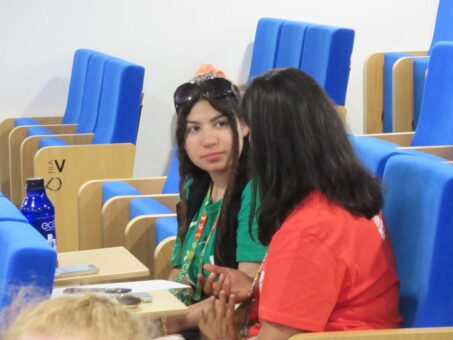
Aug 4, 2023 | Non categorizzato
During the World Youth Day 2023 in Portugal, DIALOP’s journey goes one step further. From 20 countries, 134 young peolpe participated in the workshop “Communication in times of war” promoted by DIALOP during the WYD to discuss how social media and digital technology may become traps of conspiracy and tendentious interests during conflicts. The journey Christianity and Socialism – two movements with very different characteristics – have been for long at loggerheads with each other, but have nevertheless both shaped world history in past centuries. It is based on the idea that the biggest challenges of the world today cannot be solved alone, DIALOP fosters dialogue of good willing persons, with secular and religious backgrounds, especially between Socialist/Marxists and Christians to create a transformative transversal ethic. Bringing DIALOP to the World Youth Day is part of the “DialogUE Project” which, in collaboration with the European Community involves 14 civil society organizations, explores and develops the often challenging dialogue between different groups, in order to shape a Europe that is ever more an expression of that “unity in multiplicity”. 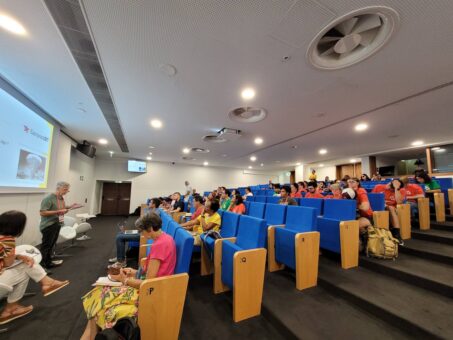 The preparation involving both Christian and Marxist-socialist experts started 6 months before the event, a committed and laborious path towards the WYD. The challenges were many, such as finding a dynamic way of mediating heavy content like conflict and communication, different languages, countries and backgrounds. “The emotion of standing before a generation that is hungry for a calming, reasoned, clear truth and hope and being able to give some of this”, Luisa Sello, one of the coordinators of the project shares her impressions. Youth in dialogue War and its destructive potential influence the structure of communication, transform the perception of facts, and instrumentalize language and mindsets. In such context, social media and digital technology may become traps of conspiracy and tendentious interests. Can we approach the truth? Can we react or are we convicted to destroy relationships with humans, countries, populations because of lies and misinformation? How can we keep making choices, build relationships, and stand with truth and justice? The workshop addressed all these challenges and engaged the youth to build on proposals for the European Union, which will be collected and presented to the EU within the European Commission funding project CERV (Citizens, Equality, Rights and Values Programme) in March 2024. After panels and dynamics discussions, the question “what can we do?” resonated among the youth. The desire of being part of a transformation as a changemaker is at the heart of each young person present.
The preparation involving both Christian and Marxist-socialist experts started 6 months before the event, a committed and laborious path towards the WYD. The challenges were many, such as finding a dynamic way of mediating heavy content like conflict and communication, different languages, countries and backgrounds. “The emotion of standing before a generation that is hungry for a calming, reasoned, clear truth and hope and being able to give some of this”, Luisa Sello, one of the coordinators of the project shares her impressions. Youth in dialogue War and its destructive potential influence the structure of communication, transform the perception of facts, and instrumentalize language and mindsets. In such context, social media and digital technology may become traps of conspiracy and tendentious interests. Can we approach the truth? Can we react or are we convicted to destroy relationships with humans, countries, populations because of lies and misinformation? How can we keep making choices, build relationships, and stand with truth and justice? The workshop addressed all these challenges and engaged the youth to build on proposals for the European Union, which will be collected and presented to the EU within the European Commission funding project CERV (Citizens, Equality, Rights and Values Programme) in March 2024. After panels and dynamics discussions, the question “what can we do?” resonated among the youth. The desire of being part of a transformation as a changemaker is at the heart of each young person present. 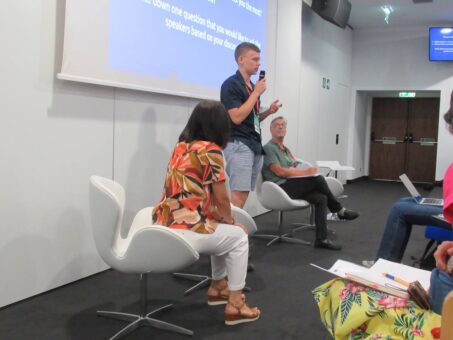 Steven, from the USA, wants to become a priest and travel overseas to help people shared his perplexities: “I can’t even tell my parents to stop reading sources of information that are problematic. When Jesus returned from Nazareth he was rejected by his family. So many of us have lost hope. Where do we get our hope back? That’s why we’re here at the WYD.” Adriana, a journalism student from Argentina felt encouraged by the workshop “Our role as the youth is very important to fight against disinformation and it can be done also in a fun way. If we create community we can be stronger.” Towards a transversal ethics The course of history depends not only on the strength of ideas but more heavily on the evolution of political and economic interests that integrate more than once only pale reflections of these ideas. The calling of Pope Francis in 2014 that inspired DIALOP to initiate a transversal dialogue continues to unfold.
Steven, from the USA, wants to become a priest and travel overseas to help people shared his perplexities: “I can’t even tell my parents to stop reading sources of information that are problematic. When Jesus returned from Nazareth he was rejected by his family. So many of us have lost hope. Where do we get our hope back? That’s why we’re here at the WYD.” Adriana, a journalism student from Argentina felt encouraged by the workshop “Our role as the youth is very important to fight against disinformation and it can be done also in a fun way. If we create community we can be stronger.” Towards a transversal ethics The course of history depends not only on the strength of ideas but more heavily on the evolution of political and economic interests that integrate more than once only pale reflections of these ideas. The calling of Pope Francis in 2014 that inspired DIALOP to initiate a transversal dialogue continues to unfold.  When asked by a young person how to create a common ethical framework when there is so much division, Walter Baier, the President of the Party of the European Left answered: “Pope Francis said that we have to accept conflict as something natural, what we need to know is what to do with the conflict. The fact that Christians and marxists coming from very different traditions, even with very different languages, can sit together and work on a common framework is an example of dialogue.” Angelina Giannopoulou, from transform!europe and José Manuel Pureza from Bloco de Esquerda also lectured besides Michele Zanzucchi and Ana Clara Giovani from Sophia University together with Maria Chiara de Lorenzo from the Focolare Movement. In the future, as part of DialogUE Project, DIALOP will hold other symposia on ecology and social policies. For more information, access https://dialop.eu
When asked by a young person how to create a common ethical framework when there is so much division, Walter Baier, the President of the Party of the European Left answered: “Pope Francis said that we have to accept conflict as something natural, what we need to know is what to do with the conflict. The fact that Christians and marxists coming from very different traditions, even with very different languages, can sit together and work on a common framework is an example of dialogue.” Angelina Giannopoulou, from transform!europe and José Manuel Pureza from Bloco de Esquerda also lectured besides Michele Zanzucchi and Ana Clara Giovani from Sophia University together with Maria Chiara de Lorenzo from the Focolare Movement. In the future, as part of DialogUE Project, DIALOP will hold other symposia on ecology and social policies. For more information, access https://dialop.eu
Ana Clara Giovani
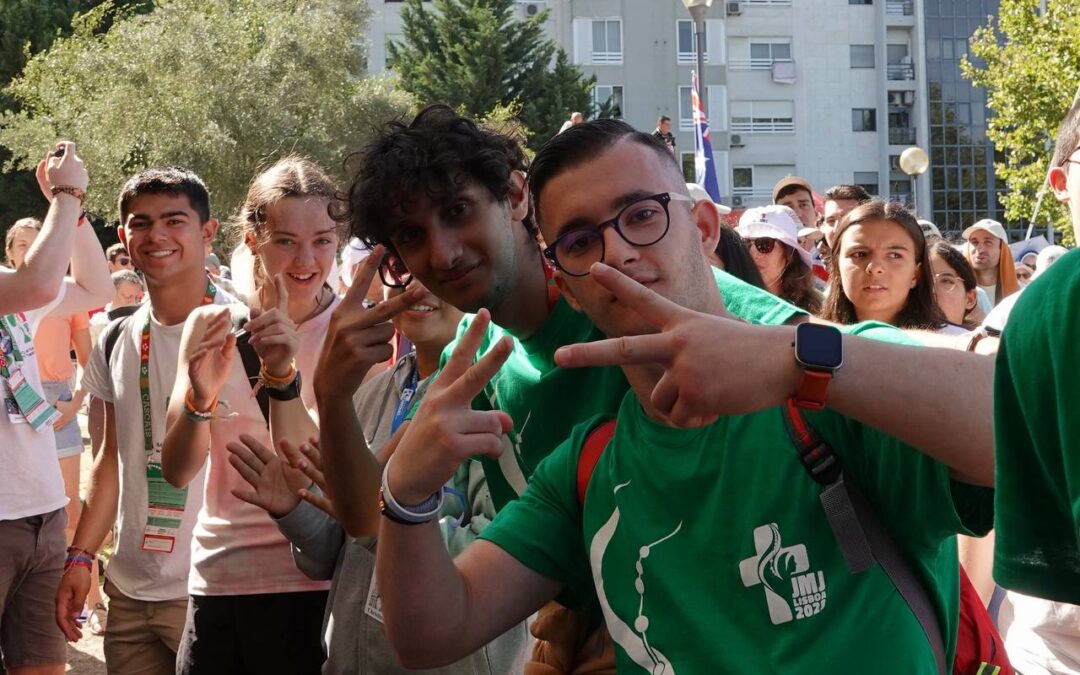
Aug 4, 2023 | Non categorizzato
The young people who have been getting ready for the WYD for some time are excited to meet Pope Francis. In these first few days in Lisbon (Portugal), they took part in the “Rise Up” meetings.
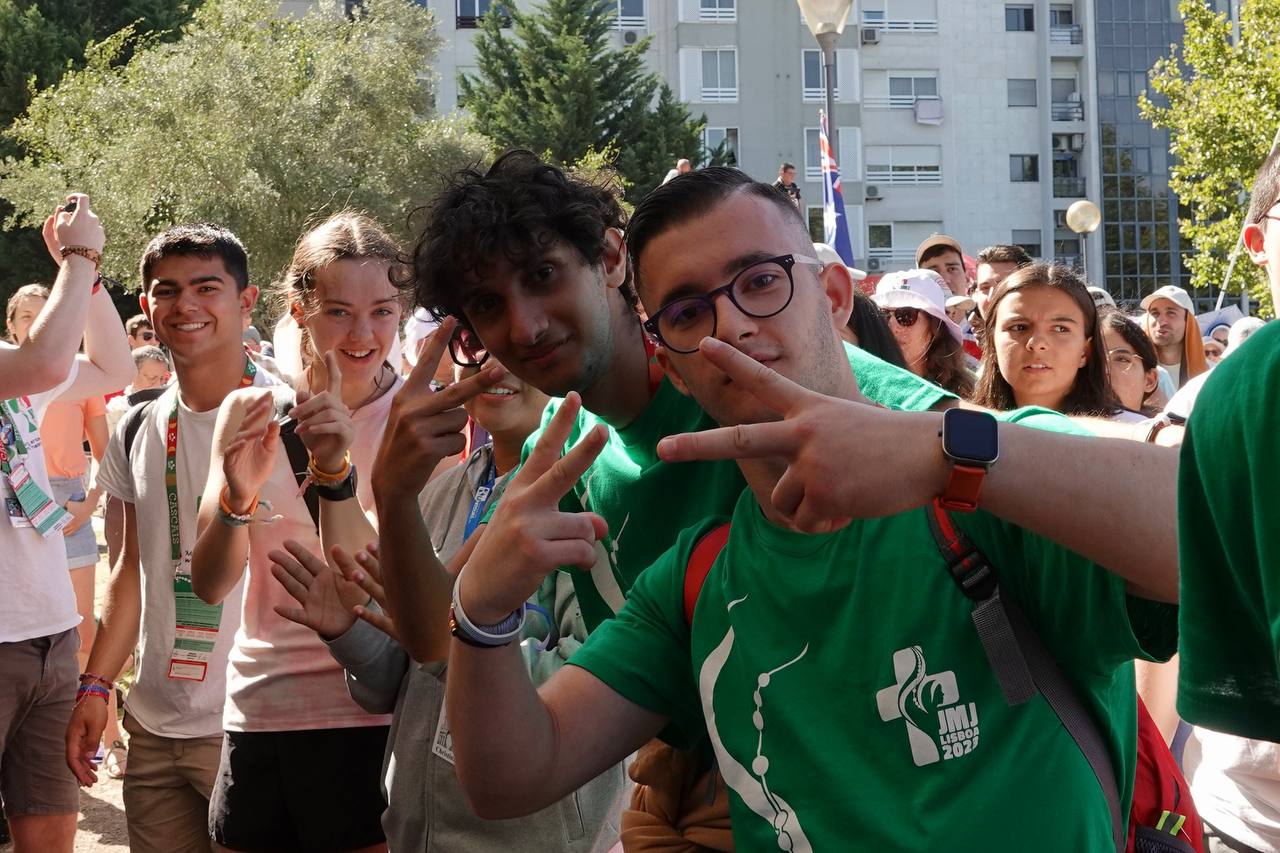 As the time of writing, the XXXVIII World Youth Day has just reached its halfway point. The first 4, very intense days, have permeated the life of over half a million young people who welcomed Pope Francis on 3rd August 2023 in the heart of Lisbon (Portugal). They gathered at Parque Eduardo VII, which was renamed “Hill of Encounter”, as a sign of the profound significance of this WYD, which underlines: relationship with God, with oneself and then with others, to build a peaceful, sustainable and fraternal world.
As the time of writing, the XXXVIII World Youth Day has just reached its halfway point. The first 4, very intense days, have permeated the life of over half a million young people who welcomed Pope Francis on 3rd August 2023 in the heart of Lisbon (Portugal). They gathered at Parque Eduardo VII, which was renamed “Hill of Encounter”, as a sign of the profound significance of this WYD, which underlines: relationship with God, with oneself and then with others, to build a peaceful, sustainable and fraternal world.
With the cry of “God loves everyone”, in a Church where there is room for everyone, Francis officially inaugurated the Portuguese World Youth Day which the media is amply covering every day.
However, what risks being overlooked is the important work of updating that the Church, in the most universal sense of the term, has carried out, so that this World Day could be a place where young people “find themselves” in their questions, in their conscious or unconscious search for God to have him as a partner in their lives; in the creation of spaces for sharing, inspiration and mutual listening. This process has involved young people, their teachers, priests and bishops, and many ecclesial realities.
“Rise Up” Meetings: spaces to think, share and be inspired
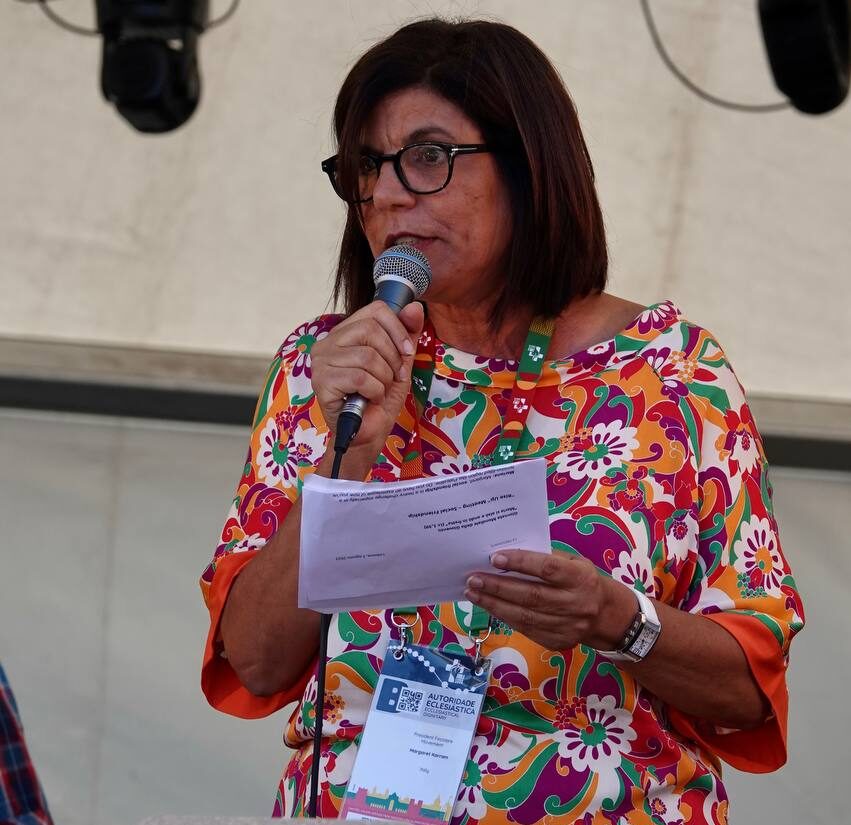
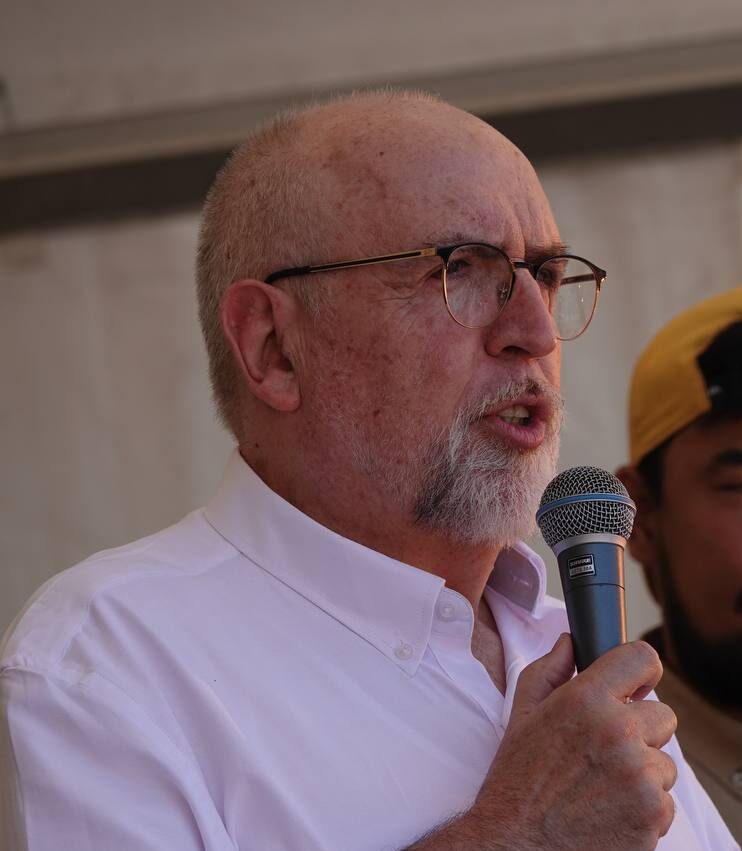 Undoubtedly one of the biggest novelties of this WYD are the “Rise Up” meetings, the new model of catechesis which invites the young people to reflect on the major themes addressed during the pontificate of Pope Francis: integral ecology, social friendship and universal brotherhood, mercy.
Undoubtedly one of the biggest novelties of this WYD are the “Rise Up” meetings, the new model of catechesis which invites the young people to reflect on the major themes addressed during the pontificate of Pope Francis: integral ecology, social friendship and universal brotherhood, mercy.
There are 270 meetings held in 30 languages which are all linked to the general theme of the WYD: “”Mary arose and went with haste” (Lk 1:39).
The Focolare Movement has been involved in the Rise Up meetings, offering 3 half-day appointments for English-speaking pilgrims, attended by an average of 5,000 young people a day. Eunice, a member of the organizing team told us, “I immediately felt responsible. The theme of this WYD inspires me a lot: I too feel driven to get up and go quickly, like Mary; I feel a strong motivation to give more, to overcome limits, tiredness and difficulties, as she did when she went to visit Elisabeth. She didn’t stop, but she loved”. Margaret Karram and Jesús Morán, President and Co-President of the Focolare, shared the stage with Card. Patrick O’Malley from Boston (USA), Archbishop Anthony Fisher from Sydney (Australia) and Bishop Robert Barron from Winona- Rochester in Minnesota (USA).
Teenagers at the WYD in Lisbon
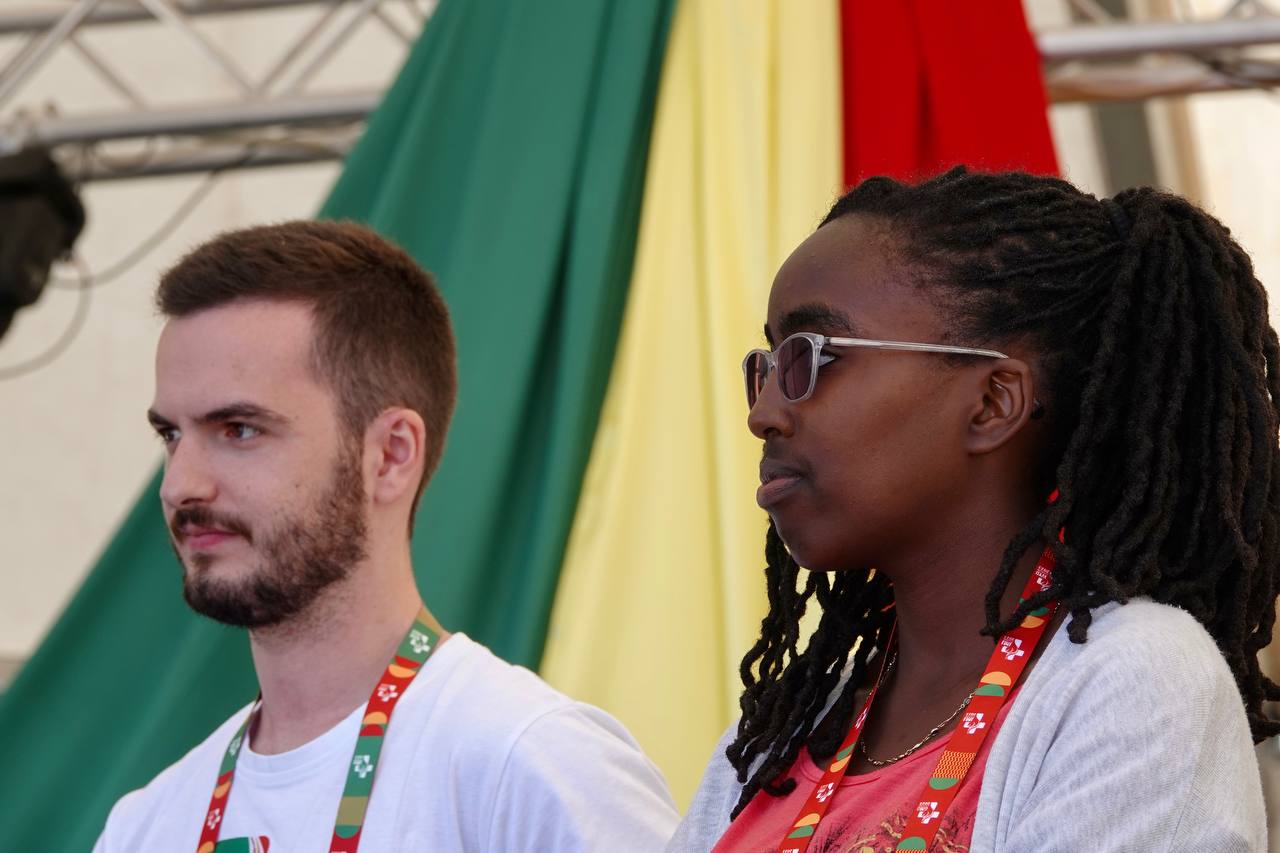 Experiencing God’s love and taking it wherever you are or feel called to be, was the thread running through the meetings enlivened by music, prayer and a lot of sharing. Pete, from the United States, at his first WYD, said, “I felt that after a year and a half of ‘isolation’, after Covid, something in me had changed. I decided to get involved and come with my diocese. I wanted to get out of my comfort zone, meet young people from other countries, see how they deal with problems. I still have many questions, I have found some answers here”.
Experiencing God’s love and taking it wherever you are or feel called to be, was the thread running through the meetings enlivened by music, prayer and a lot of sharing. Pete, from the United States, at his first WYD, said, “I felt that after a year and a half of ‘isolation’, after Covid, something in me had changed. I decided to get involved and come with my diocese. I wanted to get out of my comfort zone, meet young people from other countries, see how they deal with problems. I still have many questions, I have found some answers here”.
For the young people from Slovakia it was a big decision to come and open up to people of other cultures and ways of doing things. They are greatly looking forward to what the Pope will say in the coming days. “We are sure that his words will remain in our hearts forever and will help us in the different situations of life”.
This meeting one another, recognizing each other as brothers and sisters is perhaps the most characteristic feature of this event. This is why personal stories are central to the Rise Up meetings.
Real life at the Centre of it all
For example, Lucas, who lives in the Brazilian Amazon. At the WYD in Panama he was captivated by the person of Jesus. When he went home, with about twenty young people he got involved in a project to help the indigenous communities of his country. They spent a fortnight with a team of doctors, nurses and psychologists who bring aid, treatment and support to many people who live far from treatment centres. Lucas said, “It was an incredible experience: giving myself from morning to night, without stopping. The Amazon Project has made me grow a lot as a person. The first result of all this is me: I have changed, I am no longer the same”.
Sofia, from Argentina, talked about her existential journey of searching for meaning. At one point she heard about Blessed Chiara Luce Badano whose yes to God, even in her pain, gave her the strength to dedicate her life to God, following the spirituality of the Focolare Movement.
And we could go on and on because we heard many testimonies and also the responses of the bishops and leaders to the questions of the young people.
Pat, aged 19, from Sydney, said, “I came to this WYD with a group of friends and this is important to me because I believe that we need others in order to be able to make a difference in the world and even to make personal decisions. Loneliness is a challenge for many young people of my age and I want to do something about it by starting with loving my friends. I understood here that this is the right path”.
These young people have many questions and also fears, but there’s more: they want to open up, to learn; they come from very different backgrounds and experiences, yet they are all here to meet Pope Francis, to discover God in their lives and to meet friends with whom to share this discovery. This is the essence of the WYD in Lisbon.
Stefania Tanesini
To read the full speeches:
Margaret Karram, Catechesis of 2nd August 2023, Rise up meeting, WYD Lisbon (Portugal)
Jesús Morán, Catechesis of 2nd August 2023, Rise up meeting, WYD Lisbon (Portugal)
Margaret Karram, Catechesis of 3rd August 2023, Rise up meeting, WYD Lisbon (Portugal)
Jesús Morán, Catechesis of 3rd August 2023, Rise up meeting, WYD Lisbon (Portugal)
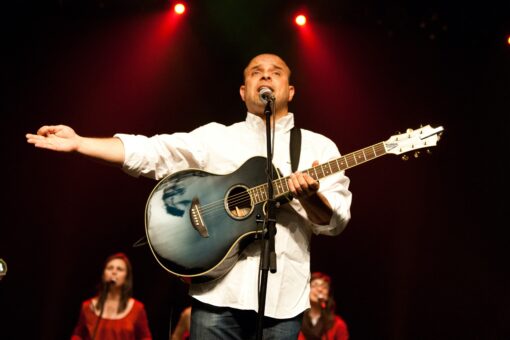
Jul 31, 2023 | Non categorizzato
A song for young people from all over the world to sing in unison. Father João Paulo Vaz, a priest from Coimbra (Portugal) wrote the lyrics of the WYD Lisbon 2023 anthem and the music was composed by Pedro Ferreira, a teacher and musician. Two young people from the Focolare Movement (Gen), Lourdes Catalán and Ivan Ho, interviewed him. World Youth Day (WYD) 2023 takes place very soon and in the streets of Lisbon (Portugal), the city hosting this global event, you can already hear the first young people to arrive singing “Há Pressa no Ar” (Feel the rush in the air), the official theme tune inspired by the words “Mary got up and went in haste” (Lk 1:39). Here we discover with Father João Paulo Vaz, a priest in the Coimbra diocese who wrote the lyrics, how the song came about. Lourdes: Father João Paulo, what does the WYD mean to you and why did you decide to enter the competition to select a theme tune for Lisbon 2023? 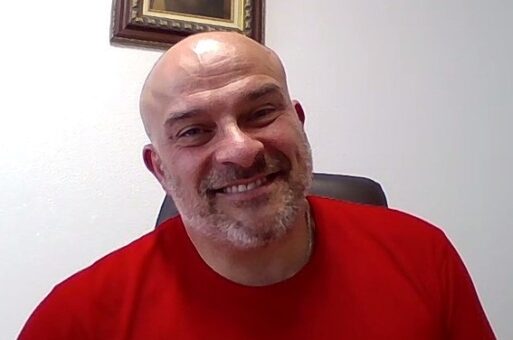 Father João Paulo Vaz: I have participated in no less than six WYDs in my life (Paris, Rome, Toronto, Cologne, Sydney and Madrid), some of them as head of youth pastoral work in the diocese. Each of them has marked my journey as a man, a Christian and a priest. They have been very intense experiences of faith and communion, and some things in particular really left their mark. One of them has always been the theme tune. When I heard we could participate in the competition for the Lisbon 2023 theme tune, I was very happy, both because of my personal experience and as a composer. I had decided to submit the lyrics but, at a certain point, I realised I had forgotten to register in time because you had to declare your intention to participate before submitting the song. When I realised this I was very sad, but God never leaves me alone. A group of participants who HAD signed up on time and only had a musical score ready asked me anyway if they could use my words and that’s how I entered the competition. Shortly afterwards, I learned with great joy that my song had been chosen. I was overjoyed because I really felt it was God’s answer to my wish. Ivan: What message did you want to convey through the song? Father João Paulo Vaz: First of all, the message I thought of addressing to each young person is “Christ is always with you, He never abandons you and with Him you will be able to love much more”. That is why, with Him, “my voice rises higher and everyone will hear it”, as the song explains, because you are no longer afraid. The whole text takes this direction and Mary, the main protagonist of this WYD, in the simplicity and humility of her figure, represents all these things: She whose voice rises first because she brings Christ with her; the first evangeliser who, with her ‘yes’ and on her way to Elizabeth, also shows us how to bring Him to others. Ivan: So many young people from all over the world are expected in Lisbon. How does it feel to think that they will all sing this song together? Father João Paulo Vaz: It’s really important to say that as soon as the song was chosen as the WYD anthem, it no longer belonged to us, it was no longer ours. It was no longer my words or Pedro Ferreira’s music. It is the theme song of WYD Lisbon 2023. I will sing it with the others: this will be the greatest joy. Lourdes: If you could sum up the theme tune in one or two words, what would they be?
Father João Paulo Vaz: I have participated in no less than six WYDs in my life (Paris, Rome, Toronto, Cologne, Sydney and Madrid), some of them as head of youth pastoral work in the diocese. Each of them has marked my journey as a man, a Christian and a priest. They have been very intense experiences of faith and communion, and some things in particular really left their mark. One of them has always been the theme tune. When I heard we could participate in the competition for the Lisbon 2023 theme tune, I was very happy, both because of my personal experience and as a composer. I had decided to submit the lyrics but, at a certain point, I realised I had forgotten to register in time because you had to declare your intention to participate before submitting the song. When I realised this I was very sad, but God never leaves me alone. A group of participants who HAD signed up on time and only had a musical score ready asked me anyway if they could use my words and that’s how I entered the competition. Shortly afterwards, I learned with great joy that my song had been chosen. I was overjoyed because I really felt it was God’s answer to my wish. Ivan: What message did you want to convey through the song? Father João Paulo Vaz: First of all, the message I thought of addressing to each young person is “Christ is always with you, He never abandons you and with Him you will be able to love much more”. That is why, with Him, “my voice rises higher and everyone will hear it”, as the song explains, because you are no longer afraid. The whole text takes this direction and Mary, the main protagonist of this WYD, in the simplicity and humility of her figure, represents all these things: She whose voice rises first because she brings Christ with her; the first evangeliser who, with her ‘yes’ and on her way to Elizabeth, also shows us how to bring Him to others. Ivan: So many young people from all over the world are expected in Lisbon. How does it feel to think that they will all sing this song together? Father João Paulo Vaz: It’s really important to say that as soon as the song was chosen as the WYD anthem, it no longer belonged to us, it was no longer ours. It was no longer my words or Pedro Ferreira’s music. It is the theme song of WYD Lisbon 2023. I will sing it with the others: this will be the greatest joy. Lourdes: If you could sum up the theme tune in one or two words, what would they be?  Father João Paulo Vaz: The first is “depth”, which means discovering who we are, discovering Christ in us and living from that discovery; the second is “courage”, to be the presence of God in the world, to announce life. It is in these two words, in my opinion, that the experience of faith flourishes. Ivan: What is your personal message for the young people of today? Father João Paulo Vaz: I would like to use the words of Pope Francis, spoken in one of the promotional videos for the WYD, in which he invites us to go ahead without fear, to build a better world and to be protagonists. We really need our young people to value the world more, to return to true values. We need to do away with fear and be aware that young people are the ones who will build a better future. So, dear young person, you can’t sit still and watch the world from your armchair. You need to get up and go, like Mary. The WYD, and this one in particular, is an opportunity to say that you believe and that you are willing to do what God asks of you; more than anything else, it is telling you that you are not alone in this. A whole world of young people and the Pope are ready to walk with you.
Father João Paulo Vaz: The first is “depth”, which means discovering who we are, discovering Christ in us and living from that discovery; the second is “courage”, to be the presence of God in the world, to announce life. It is in these two words, in my opinion, that the experience of faith flourishes. Ivan: What is your personal message for the young people of today? Father João Paulo Vaz: I would like to use the words of Pope Francis, spoken in one of the promotional videos for the WYD, in which he invites us to go ahead without fear, to build a better world and to be protagonists. We really need our young people to value the world more, to return to true values. We need to do away with fear and be aware that young people are the ones who will build a better future. So, dear young person, you can’t sit still and watch the world from your armchair. You need to get up and go, like Mary. The WYD, and this one in particular, is an opportunity to say that you believe and that you are willing to do what God asks of you; more than anything else, it is telling you that you are not alone in this. A whole world of young people and the Pope are ready to walk with you.
Lourdes Catalán e Ivan Ho
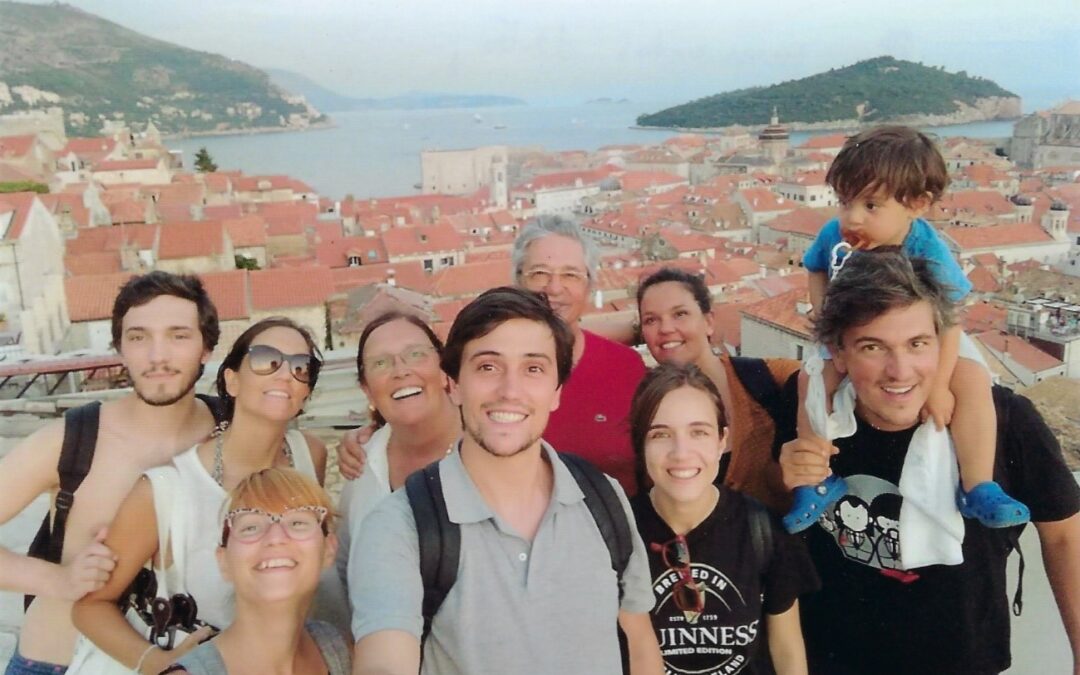
Jul 26, 2023 | Non categorizzato
The 37th World Youth Day (WYD), which will be held from 31st July to 6th August 2023 in Lisbon (Portugal), is upon us and many young people are preparing to experience this global event with the Pope. Various initiatives have been organized and for months now, many people have been working with dedication on this moment of true family for the Church. Everything is ready. The sun is high on the seven hills of Lisbon (Portugal) and the ocean breeze brings with it an air of novelty and anticipation: the WYD is upon us and young people from all over the world are arriving. After months of preparation and having visited various stops throughout the country, last weekend the symbols of the Day, the Pilgrim’s Cross and the Icon of Our Lady “Salus Popoli Romani”, finally reached Lisbon and we are now ready to welcome the first young people arriving for the “Days in the Dioceses” which will take place from 26th-31st July 2023 in the 17 dioceses of mainland Portugal and the islands. A way to prepare pilgrims and host communities to get into the event and live it to the full. Father José Cardoso de Almeida, parish priest of Sátão, in the diocese of Viseu, a priest volunteer of the Focolare Movement told us, “When we were told that WYD would be held in Lisbon, we welcomed the news with immense joy. I am sure that it will be an occasion of grace for each of the participants, as well as for our country. In my case, I feel I have to be open to the surprises that the Spirit wants to communicate”. 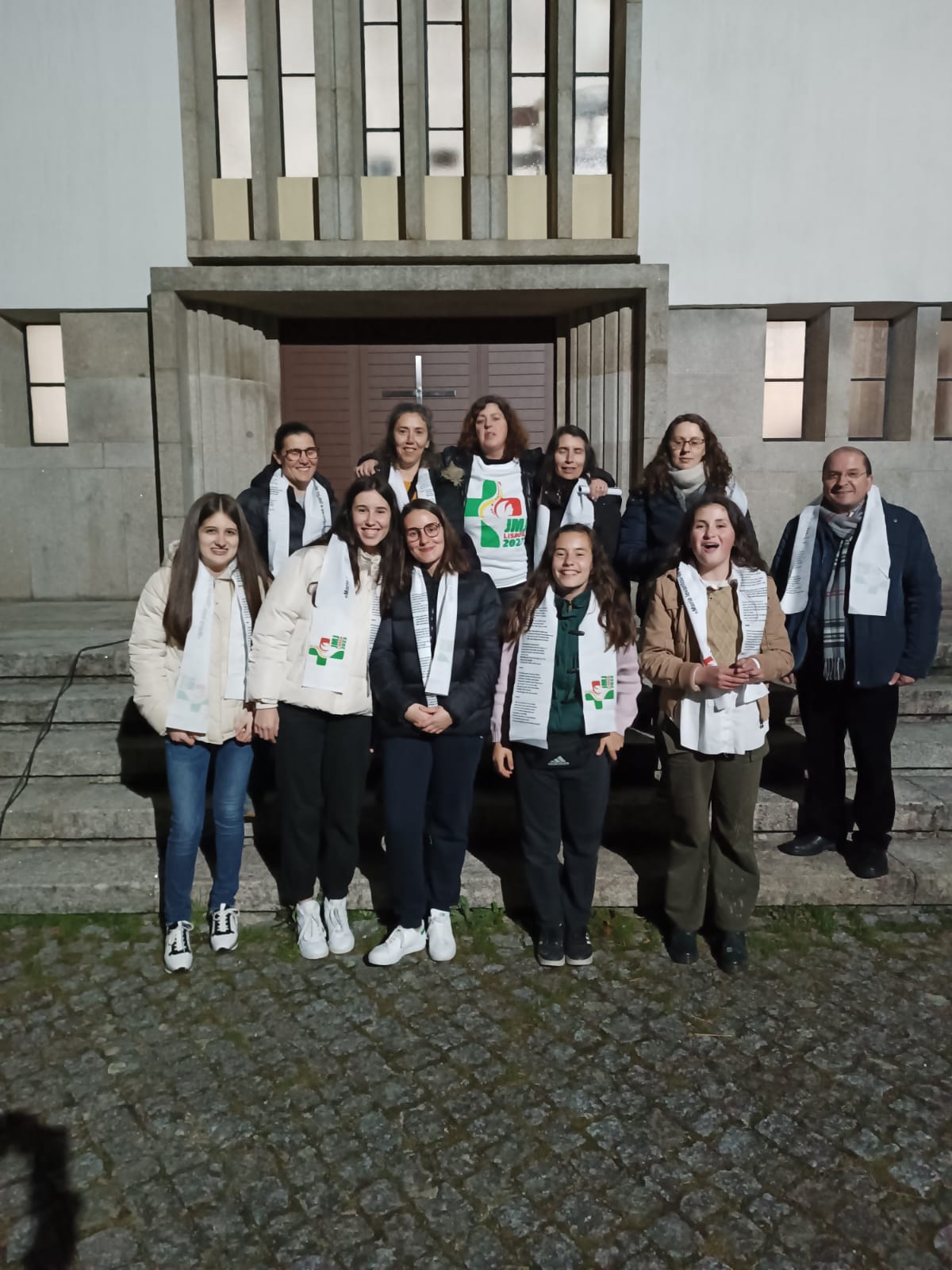 Fr. José has experienced the anticipation and enthusiasm of several WYDs first-hand. Like many other people, he immediately felt the call to get involved in organizing this Event which was taking place in his own “backyard”, by motivating young people and welcoming those who would come from various parts of the world: “This last year has been full of meetings. A lot of activities were organized to help cover the expenses of those who had greater economic challenges to get here. As a ‘little builder’ of this WYD, together with many others, I encouraged some families to open their doors to young people from other countries for the ‘Days in the Dioceses’. In our area, we will welcome about 3,000 young people, mostly French. Then we will leave for Lisbon and I will lend a hand for the sacrament of Reconciliation, during the event.” It has been a concrete experience that shows how serving others generated countless fruits in the various communities. As Fr. José said, “For example, the discovery of the beauty of working together. I think that today’s young people need to discover that the secret of happiness lies in true love, and as Pope Francis says, in the experience of “going out of oneself” and “being with and for others.” This is true unity. ” And it is in this “going out” that we find the image of the Virgin Mary, ready to “get up and go with haste”, as the motto of this WYD announces, on the way to visit Elizabeth. Ana and José Maria Raposo told us that this is an “invitation to encounter the living Jesus in the family, at work, in social and political life”. They are from the parish of Nossa Senhora da Conceição dos Olivais Sul in Lisbon and are members of the Volunteers of God of the Focolare Movement. Ana and José have been married for 45 years, have five children and four grandchildren and are one of the many Portuguese families who will host the young people who will take part in the WYD in their own homes.
Fr. José has experienced the anticipation and enthusiasm of several WYDs first-hand. Like many other people, he immediately felt the call to get involved in organizing this Event which was taking place in his own “backyard”, by motivating young people and welcoming those who would come from various parts of the world: “This last year has been full of meetings. A lot of activities were organized to help cover the expenses of those who had greater economic challenges to get here. As a ‘little builder’ of this WYD, together with many others, I encouraged some families to open their doors to young people from other countries for the ‘Days in the Dioceses’. In our area, we will welcome about 3,000 young people, mostly French. Then we will leave for Lisbon and I will lend a hand for the sacrament of Reconciliation, during the event.” It has been a concrete experience that shows how serving others generated countless fruits in the various communities. As Fr. José said, “For example, the discovery of the beauty of working together. I think that today’s young people need to discover that the secret of happiness lies in true love, and as Pope Francis says, in the experience of “going out of oneself” and “being with and for others.” This is true unity. ” And it is in this “going out” that we find the image of the Virgin Mary, ready to “get up and go with haste”, as the motto of this WYD announces, on the way to visit Elizabeth. Ana and José Maria Raposo told us that this is an “invitation to encounter the living Jesus in the family, at work, in social and political life”. They are from the parish of Nossa Senhora da Conceição dos Olivais Sul in Lisbon and are members of the Volunteers of God of the Focolare Movement. Ana and José have been married for 45 years, have five children and four grandchildren and are one of the many Portuguese families who will host the young people who will take part in the WYD in their own homes. 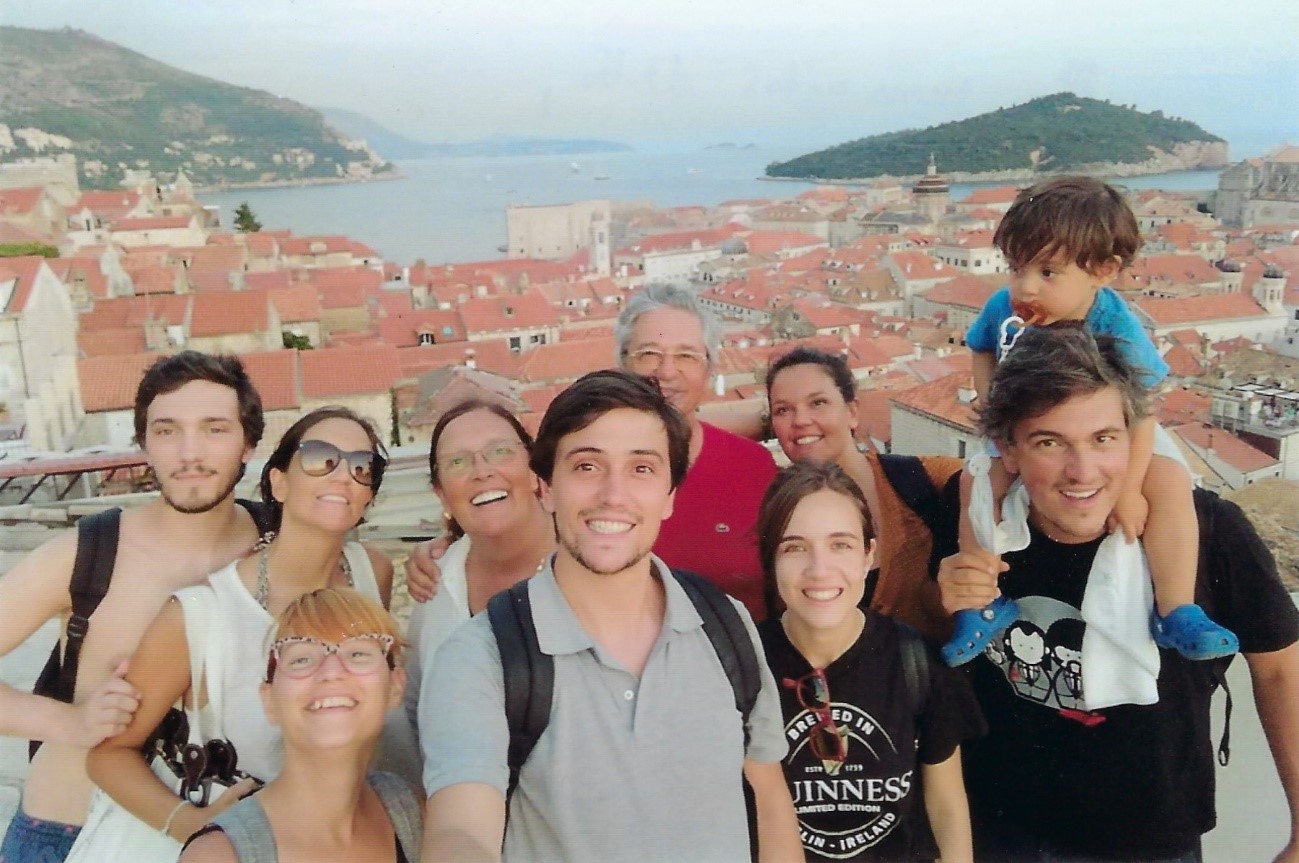 They told us, “For young people, like Mary, to live their vocation, it is necessary to believe in them and let them lead, without forgetting the importance of inter-generationality. It is necessary to believe that the world today is already changed if hearts are changed, if the mind is free, if one leaves one’s comfort zone, if one looks around and sees Jesus in everyone; we have to believe that a united world is possible”. QQ An experience that looks at this fragile time, looks at the other and is strengthened thanks also to the concrete witness of those who, believing in love, want to put it at the service in the “welcome” that, as Ana and José say, “means to be a family for those who arrive. It was spontaneous for us to immediately join in welcoming the young pilgrims who will participate in the WYD. We have always welcomed people who needed help because they were passing through or traveling. The last few months gave us an opportunity to review things and reorganize the spaces so that the young people who arrive really feel at home.” World Youth Day continues to prove to be, even today, a great event of the Church that, around the Pope and young people from all over the world, becomes “Community”. And to be, as Father José Cardoso de Almeida stated, “a workshop of the Kingdom of God and the image of that universal fraternity that derives from the Gospel”.
They told us, “For young people, like Mary, to live their vocation, it is necessary to believe in them and let them lead, without forgetting the importance of inter-generationality. It is necessary to believe that the world today is already changed if hearts are changed, if the mind is free, if one leaves one’s comfort zone, if one looks around and sees Jesus in everyone; we have to believe that a united world is possible”. QQ An experience that looks at this fragile time, looks at the other and is strengthened thanks also to the concrete witness of those who, believing in love, want to put it at the service in the “welcome” that, as Ana and José say, “means to be a family for those who arrive. It was spontaneous for us to immediately join in welcoming the young pilgrims who will participate in the WYD. We have always welcomed people who needed help because they were passing through or traveling. The last few months gave us an opportunity to review things and reorganize the spaces so that the young people who arrive really feel at home.” World Youth Day continues to prove to be, even today, a great event of the Church that, around the Pope and young people from all over the world, becomes “Community”. And to be, as Father José Cardoso de Almeida stated, “a workshop of the Kingdom of God and the image of that universal fraternity that derives from the Gospel”.
Maria Grazia Berretta
Jul 25, 2023 | Non categorizzato
The Word of life for this month is, “Whoever gives even a cup of cold water to one of these little ones in the name of a disciple, truly I tell you: none of these will lose their reward” (Mt 10:42). This is the mission to which each of us, just like the disciples, is called: to be credible witnesses of the Love of Christ, in the concrete gestures that are part of our daily lives; a circular Love, which you give with joy and are surprised when it returns abundantly. New Car Accident When I returned to the car park, I found that the new car that my father had lent me was scratched. What could I do? I felt bad because he would be upset and I started to think about how much it would cost to have it repaired. Then I noticed a small magnet on the dashboard holding this writing: “…cast all your worries onto Him because He cares for you”. I tried to do that. And I felt a sense of peace which is what I needed in order to try to figure out what to do. I was absorbed in these thoughts when there was a knock on the window. A lady wanted to talk to me. She was the one who had scraped the car and had left hoping to get away with it, but remorse made her come back. She gave me her phone number and agreed to look after the cost of getting the car repaired. I was amazed and grateful. I told her how I had found peace reading that sentence on the dashboard. And she thoughtfully replied, “It was Him who brought me back.” (Z.X. – Croatia) The right place When I was transferred to the Intensive Care Unit, I realized that my medical competence would be put to the test there and at the same time I felt that that was “my” place. Up until then, I had not had the opportunity to work in such a department where every day, suffering appeared in the most tragic forms: people who had serious accidents, neurological problems… and they were often young people. I wasn’t sure I was up to it. However, the idea of putting myself at the service of Jesus who was present and identified with all those people gave me strength. He said “You did it to me”. After six months, the hospital management offered me the position of head of the department. The reasons for their choice included: my ability to integrate with colleagues, my attitude of calm and peace, and my professional behaviour. The next day in the chapel, I thanked Jesus: it was his words that made me be what others needed above all there, in that place. (J.M. – Spain)
The exam I was preparing for an important exam at university when a friend who was going through a difficult time with his girlfriend came to visit me. I welcomed him and while I was preparing a meal for him, we started talking. The thought of the exam was really on my mind but I tried to set it aside to concentrate on listening to my friend, who was so upset and sad that he did not realize that time was passing and it was time to go to bed. In the end, I offered him a bed for the night. It was really late and I couldn’t even think of opening a book. The next morning the alarm woke me up and a colleague reminded me that I had to turn up for the exam. Still half asleep, I quickly got ready to go out, while my friend continued to sleep. I never dreamt I would pass that exam! I was very happy. When I went back to my room, there was a note on the table: «I don’t know how to thank you. You showed me that I mean something. You gave me new strength. Like you, I want to be “completely there for others.” (G.F. – Poland)
Curated by Maria Grazia Berretta
(taken from The Gospel of the Day, New Town, year IX – n.1° July-August 2023)

 It is difficult to describe what we experienced during these unforgettable days of grace. I know it is a cliché to say that you have to experience it to understand it. But it is true! It is certainly true on this occasion. I have participated in four WYDs, the first two and the last two, and I can testify that there is something about these days that cannot be explained. A well-known Portuguese public figure, who is agnostic and a cinema lover, wrote in a newspaper article that what he contemplated on the streets of Lisbon in this scorching summer was the most beautiful film he had ever seen. It was impossible not to be uplifted by the cheerfulness and liveliness poured out in torrents by the young people who had come to the ‘city of light’ and who filled it with the other light they carried within themselves. We saw them everywhere, in the shopping malls, in the metro, on the buses, in the bars, in the parks or on the roads. They gathered in small and large groups, and were like multi-coloured, loud, talkative, multi-charismatic human rivers, with a kindliness that warmed the heart. Walking among them, I saw the inhabitants of the city; some were puzzled, some interested. If Lisbon, with its magical and indescribable beauty, was a gift for these young people, they were no less a gift for this city, which will be proud to have seen one and a half million young people come together to celebrate their faith in Christ, something previously unheard of.
It is difficult to describe what we experienced during these unforgettable days of grace. I know it is a cliché to say that you have to experience it to understand it. But it is true! It is certainly true on this occasion. I have participated in four WYDs, the first two and the last two, and I can testify that there is something about these days that cannot be explained. A well-known Portuguese public figure, who is agnostic and a cinema lover, wrote in a newspaper article that what he contemplated on the streets of Lisbon in this scorching summer was the most beautiful film he had ever seen. It was impossible not to be uplifted by the cheerfulness and liveliness poured out in torrents by the young people who had come to the ‘city of light’ and who filled it with the other light they carried within themselves. We saw them everywhere, in the shopping malls, in the metro, on the buses, in the bars, in the parks or on the roads. They gathered in small and large groups, and were like multi-coloured, loud, talkative, multi-charismatic human rivers, with a kindliness that warmed the heart. Walking among them, I saw the inhabitants of the city; some were puzzled, some interested. If Lisbon, with its magical and indescribable beauty, was a gift for these young people, they were no less a gift for this city, which will be proud to have seen one and a half million young people come together to celebrate their faith in Christ, something previously unheard of. The Portuguese Church and the Dicastery for the Laity, Family and Life, the organisers of the event, together with the city and its civil authorities, did an amazing job. But there is no doubt that the prize goes to the young people. Who could have imagined this happening after three years of a serious pandemic and in the midst of an institutional crisis, such as the one the Catholic Church is going through because of abuses of various kinds?! Even though today the Spanish press gave coverage to the case of a girl with 5% visual capacity who claims to have recovered her sight in the past few days, for me the real miracle was the living faith of these young people, expressed in their own words and with a multitude of bold and even disconcerting gestures.
The Portuguese Church and the Dicastery for the Laity, Family and Life, the organisers of the event, together with the city and its civil authorities, did an amazing job. But there is no doubt that the prize goes to the young people. Who could have imagined this happening after three years of a serious pandemic and in the midst of an institutional crisis, such as the one the Catholic Church is going through because of abuses of various kinds?! Even though today the Spanish press gave coverage to the case of a girl with 5% visual capacity who claims to have recovered her sight in the past few days, for me the real miracle was the living faith of these young people, expressed in their own words and with a multitude of bold and even disconcerting gestures. In fact, while they showed an overflowing enthusiasm by singing and dancing, the most emblematic moment – indeed the real centrepiece of the event – was once again the Eucharistic adoration at the vigil: more than a million people knelt down without anyone telling them to do so, to adore in ‘deafening’ silence the One they consider the ‘heart of the world’! It was impossible not to be moved. And at that moment, the fado given to us by the singer Carminho gave us goosebumps: ‘You are the star that guides my heart/ You are the star that has lit my path/ You are the sign that I guide destiny/ You are the star, and I am the pilgrim’. And one wonders at the power of attraction that a small host can exert on such a large crowd of young people spread over a field over three kilometres long (100 football pitches).
In fact, while they showed an overflowing enthusiasm by singing and dancing, the most emblematic moment – indeed the real centrepiece of the event – was once again the Eucharistic adoration at the vigil: more than a million people knelt down without anyone telling them to do so, to adore in ‘deafening’ silence the One they consider the ‘heart of the world’! It was impossible not to be moved. And at that moment, the fado given to us by the singer Carminho gave us goosebumps: ‘You are the star that guides my heart/ You are the star that has lit my path/ You are the sign that I guide destiny/ You are the star, and I am the pilgrim’. And one wonders at the power of attraction that a small host can exert on such a large crowd of young people spread over a field over three kilometres long (100 football pitches). Apart from these highlights, the programme was filled with many other smaller events, but which were no less significant, such as concerts in key city locations, meetings in nationalities, sharing with people involved in the Church in parishes or associations and above all the various catecheses led by the young people themselves with bishops from different parts of the world as keynote speakers. These were all opportunities to deepen the WYD motto: Rise up.
Apart from these highlights, the programme was filled with many other smaller events, but which were no less significant, such as concerts in key city locations, meetings in nationalities, sharing with people involved in the Church in parishes or associations and above all the various catecheses led by the young people themselves with bishops from different parts of the world as keynote speakers. These were all opportunities to deepen the WYD motto: Rise up. Perhaps I am too optimistic, but in these few days I have seen a young Church that has already gone a bit beyond the time of trial or is at least confident about overcoming it. The thousands and thousands of young people I met in Lisbon taught me this.
Perhaps I am too optimistic, but in these few days I have seen a young Church that has already gone a bit beyond the time of trial or is at least confident about overcoming it. The thousands and thousands of young people I met in Lisbon taught me this.

 The preparation involving both Christian and Marxist-socialist experts started 6 months before the event, a committed and laborious path towards the WYD. The challenges were many, such as finding a dynamic way of mediating heavy content like conflict and communication, different languages, countries and backgrounds. “The emotion of standing before a generation that is hungry for a calming, reasoned, clear truth and hope and being able to give some of this”, Luisa Sello, one of the coordinators of the project shares her impressions. Youth in dialogue War and its destructive potential influence the structure of communication, transform the perception of facts, and instrumentalize language and mindsets. In such context, social media and digital technology may become traps of conspiracy and tendentious interests. Can we approach the truth? Can we react or are we convicted to destroy relationships with humans, countries, populations because of lies and misinformation? How can we keep making choices, build relationships, and stand with truth and justice? The workshop addressed all these challenges and engaged the youth to build on proposals for the European Union, which will be collected and presented to the EU within the European Commission funding project CERV (Citizens, Equality, Rights and Values Programme) in March 2024. After panels and dynamics discussions, the question “what can we do?” resonated among the youth. The desire of being part of a transformation as a changemaker is at the heart of each young person present.
The preparation involving both Christian and Marxist-socialist experts started 6 months before the event, a committed and laborious path towards the WYD. The challenges were many, such as finding a dynamic way of mediating heavy content like conflict and communication, different languages, countries and backgrounds. “The emotion of standing before a generation that is hungry for a calming, reasoned, clear truth and hope and being able to give some of this”, Luisa Sello, one of the coordinators of the project shares her impressions. Youth in dialogue War and its destructive potential influence the structure of communication, transform the perception of facts, and instrumentalize language and mindsets. In such context, social media and digital technology may become traps of conspiracy and tendentious interests. Can we approach the truth? Can we react or are we convicted to destroy relationships with humans, countries, populations because of lies and misinformation? How can we keep making choices, build relationships, and stand with truth and justice? The workshop addressed all these challenges and engaged the youth to build on proposals for the European Union, which will be collected and presented to the EU within the European Commission funding project CERV (Citizens, Equality, Rights and Values Programme) in March 2024. After panels and dynamics discussions, the question “what can we do?” resonated among the youth. The desire of being part of a transformation as a changemaker is at the heart of each young person present.  Steven, from the USA, wants to become a priest and travel overseas to help people shared his perplexities: “I can’t even tell my parents to stop reading sources of information that are problematic. When Jesus returned from Nazareth he was rejected by his family. So many of us have lost hope. Where do we get our hope back? That’s why we’re here at the WYD.” Adriana, a journalism student from Argentina felt encouraged by the workshop “Our role as the youth is very important to fight against disinformation and it can be done also in a fun way. If we create community we can be stronger.” Towards a transversal ethics The course of history depends not only on the strength of ideas but more heavily on the evolution of political and economic interests that integrate more than once only pale reflections of these ideas. The calling of Pope Francis in 2014 that inspired DIALOP to initiate a transversal dialogue continues to unfold.
Steven, from the USA, wants to become a priest and travel overseas to help people shared his perplexities: “I can’t even tell my parents to stop reading sources of information that are problematic. When Jesus returned from Nazareth he was rejected by his family. So many of us have lost hope. Where do we get our hope back? That’s why we’re here at the WYD.” Adriana, a journalism student from Argentina felt encouraged by the workshop “Our role as the youth is very important to fight against disinformation and it can be done also in a fun way. If we create community we can be stronger.” Towards a transversal ethics The course of history depends not only on the strength of ideas but more heavily on the evolution of political and economic interests that integrate more than once only pale reflections of these ideas. The calling of Pope Francis in 2014 that inspired DIALOP to initiate a transversal dialogue continues to unfold. 
 As the time of writing, the XXXVIII World Youth Day has just reached its halfway point. The first 4, very intense days, have permeated the life of over half a million young people who welcomed Pope Francis on 3rd August 2023 in the heart of Lisbon (Portugal). They gathered at Parque Eduardo VII, which was renamed “Hill of Encounter”, as a sign of the profound significance of this WYD, which underlines: relationship with God, with oneself and then with others, to build a peaceful, sustainable and fraternal world.
As the time of writing, the XXXVIII World Youth Day has just reached its halfway point. The first 4, very intense days, have permeated the life of over half a million young people who welcomed Pope Francis on 3rd August 2023 in the heart of Lisbon (Portugal). They gathered at Parque Eduardo VII, which was renamed “Hill of Encounter”, as a sign of the profound significance of this WYD, which underlines: relationship with God, with oneself and then with others, to build a peaceful, sustainable and fraternal world.
 Undoubtedly one of the biggest novelties of this WYD are the “Rise Up” meetings, the new model of catechesis which invites the young people to reflect on the major themes addressed during the pontificate of Pope Francis: integral ecology, social friendship and universal brotherhood, mercy.
Undoubtedly one of the biggest novelties of this WYD are the “Rise Up” meetings, the new model of catechesis which invites the young people to reflect on the major themes addressed during the pontificate of Pope Francis: integral ecology, social friendship and universal brotherhood, mercy. Experiencing God’s love and taking it wherever you are or feel called to be, was the thread running through the meetings enlivened by music, prayer and a lot of sharing. Pete, from the United States, at his first WYD, said, “I felt that after a year and a half of ‘isolation’, after Covid, something in me had changed. I decided to get involved and come with my diocese. I wanted to get out of my comfort zone, meet young people from other countries, see how they deal with problems. I still have many questions, I have found some answers here”.
Experiencing God’s love and taking it wherever you are or feel called to be, was the thread running through the meetings enlivened by music, prayer and a lot of sharing. Pete, from the United States, at his first WYD, said, “I felt that after a year and a half of ‘isolation’, after Covid, something in me had changed. I decided to get involved and come with my diocese. I wanted to get out of my comfort zone, meet young people from other countries, see how they deal with problems. I still have many questions, I have found some answers here”.
 Father João Paulo Vaz: I have participated in no less than six WYDs in my life (Paris, Rome, Toronto, Cologne, Sydney and Madrid), some of them as head of youth pastoral work in the diocese. Each of them has marked my journey as a man, a Christian and a priest. They have been very intense experiences of faith and communion, and some things in particular really left their mark. One of them has always been the theme tune. When I heard we could participate in the competition for the Lisbon 2023 theme tune, I was very happy, both because of my personal experience and as a composer. I had decided to submit the lyrics but, at a certain point, I realised I had forgotten to register in time because you had to declare your intention to participate before submitting the song. When I realised this I was very sad, but God never leaves me alone. A group of participants who HAD signed up on time and only had a musical score ready asked me anyway if they could use my words and that’s how I entered the competition. Shortly afterwards, I learned with great joy that my song had been chosen. I was overjoyed because I really felt it was God’s answer to my wish. Ivan: What message did you want to convey through the song? Father João Paulo Vaz: First of all, the message I thought of addressing to each young person is “Christ is always with you, He never abandons you and with Him you will be able to love much more”. That is why, with Him, “my voice rises higher and everyone will hear it”, as the song explains, because you are no longer afraid. The whole text takes this direction and Mary, the main protagonist of this WYD, in the simplicity and humility of her figure, represents all these things: She whose voice rises first because she brings Christ with her; the first evangeliser who, with her ‘yes’ and on her way to Elizabeth, also shows us how to bring Him to others. Ivan: So many young people from all over the world are expected in Lisbon. How does it feel to think that they will all sing this song together? Father João Paulo Vaz: It’s really important to say that as soon as the song was chosen as the WYD anthem, it no longer belonged to us, it was no longer ours. It was no longer my words or Pedro Ferreira’s music. It is the theme song of WYD Lisbon 2023. I will sing it with the others: this will be the greatest joy. Lourdes: If you could sum up the theme tune in one or two words, what would they be?
Father João Paulo Vaz: I have participated in no less than six WYDs in my life (Paris, Rome, Toronto, Cologne, Sydney and Madrid), some of them as head of youth pastoral work in the diocese. Each of them has marked my journey as a man, a Christian and a priest. They have been very intense experiences of faith and communion, and some things in particular really left their mark. One of them has always been the theme tune. When I heard we could participate in the competition for the Lisbon 2023 theme tune, I was very happy, both because of my personal experience and as a composer. I had decided to submit the lyrics but, at a certain point, I realised I had forgotten to register in time because you had to declare your intention to participate before submitting the song. When I realised this I was very sad, but God never leaves me alone. A group of participants who HAD signed up on time and only had a musical score ready asked me anyway if they could use my words and that’s how I entered the competition. Shortly afterwards, I learned with great joy that my song had been chosen. I was overjoyed because I really felt it was God’s answer to my wish. Ivan: What message did you want to convey through the song? Father João Paulo Vaz: First of all, the message I thought of addressing to each young person is “Christ is always with you, He never abandons you and with Him you will be able to love much more”. That is why, with Him, “my voice rises higher and everyone will hear it”, as the song explains, because you are no longer afraid. The whole text takes this direction and Mary, the main protagonist of this WYD, in the simplicity and humility of her figure, represents all these things: She whose voice rises first because she brings Christ with her; the first evangeliser who, with her ‘yes’ and on her way to Elizabeth, also shows us how to bring Him to others. Ivan: So many young people from all over the world are expected in Lisbon. How does it feel to think that they will all sing this song together? Father João Paulo Vaz: It’s really important to say that as soon as the song was chosen as the WYD anthem, it no longer belonged to us, it was no longer ours. It was no longer my words or Pedro Ferreira’s music. It is the theme song of WYD Lisbon 2023. I will sing it with the others: this will be the greatest joy. Lourdes: If you could sum up the theme tune in one or two words, what would they be? 
 Fr. José has experienced the anticipation and enthusiasm of several WYDs first-hand. Like many other people, he immediately felt the call to get involved in organizing this Event which was taking place in his own “backyard”, by motivating young people and welcoming those who would come from various parts of the world: “This last year has been full of meetings. A lot of activities were organized to help cover the expenses of those who had greater economic challenges to get here. As a ‘little builder’ of this WYD, together with many others, I encouraged some families to open their doors to young people from other countries for the ‘Days in the Dioceses’. In our area, we will welcome about 3,000 young people, mostly French. Then we will leave for Lisbon and I will lend a hand for the sacrament of Reconciliation, during the event.” It has been a concrete experience that shows how serving others generated countless fruits in the various communities. As Fr. José said, “For example, the discovery of the beauty of working together. I think that today’s young people need to discover that the secret of happiness lies in true love, and as Pope Francis says, in the experience of “going out of oneself” and “being with and for others.” This is true unity. ” And it is in this “going out” that we find the image of the Virgin Mary, ready to “get up and go with haste”, as the motto of this WYD announces, on the way to visit Elizabeth. Ana and José Maria Raposo told us that this is an “invitation to encounter the living Jesus in the family, at work, in social and political life”. They are from the parish of Nossa Senhora da Conceição dos Olivais Sul in Lisbon and are members of the Volunteers of God of the Focolare Movement. Ana and José have been married for 45 years, have five children and four grandchildren and are one of the many Portuguese families who will host the young people who will take part in the WYD in their own homes.
Fr. José has experienced the anticipation and enthusiasm of several WYDs first-hand. Like many other people, he immediately felt the call to get involved in organizing this Event which was taking place in his own “backyard”, by motivating young people and welcoming those who would come from various parts of the world: “This last year has been full of meetings. A lot of activities were organized to help cover the expenses of those who had greater economic challenges to get here. As a ‘little builder’ of this WYD, together with many others, I encouraged some families to open their doors to young people from other countries for the ‘Days in the Dioceses’. In our area, we will welcome about 3,000 young people, mostly French. Then we will leave for Lisbon and I will lend a hand for the sacrament of Reconciliation, during the event.” It has been a concrete experience that shows how serving others generated countless fruits in the various communities. As Fr. José said, “For example, the discovery of the beauty of working together. I think that today’s young people need to discover that the secret of happiness lies in true love, and as Pope Francis says, in the experience of “going out of oneself” and “being with and for others.” This is true unity. ” And it is in this “going out” that we find the image of the Virgin Mary, ready to “get up and go with haste”, as the motto of this WYD announces, on the way to visit Elizabeth. Ana and José Maria Raposo told us that this is an “invitation to encounter the living Jesus in the family, at work, in social and political life”. They are from the parish of Nossa Senhora da Conceição dos Olivais Sul in Lisbon and are members of the Volunteers of God of the Focolare Movement. Ana and José have been married for 45 years, have five children and four grandchildren and are one of the many Portuguese families who will host the young people who will take part in the WYD in their own homes.  They told us, “For young people, like Mary, to live their vocation, it is necessary to believe in them and let them lead, without forgetting the importance of inter-generationality. It is necessary to believe that the world today is already changed if hearts are changed, if the mind is free, if one leaves one’s comfort zone, if one looks around and sees Jesus in everyone; we have to believe that a united world is possible”. QQ An experience that looks at this fragile time, looks at the other and is strengthened thanks also to the concrete witness of those who, believing in love, want to put it at the service in the “welcome” that, as Ana and José say, “means to be a family for those who arrive. It was spontaneous for us to immediately join in welcoming the young pilgrims who will participate in the WYD. We have always welcomed people who needed help because they were passing through or traveling. The last few months gave us an opportunity to review things and reorganize the spaces so that the young people who arrive really feel at home.” World Youth Day continues to prove to be, even today, a great event of the Church that, around the Pope and young people from all over the world, becomes “Community”. And to be, as Father José Cardoso de Almeida stated, “a workshop of the Kingdom of God and the image of that universal fraternity that derives from the Gospel”.
They told us, “For young people, like Mary, to live their vocation, it is necessary to believe in them and let them lead, without forgetting the importance of inter-generationality. It is necessary to believe that the world today is already changed if hearts are changed, if the mind is free, if one leaves one’s comfort zone, if one looks around and sees Jesus in everyone; we have to believe that a united world is possible”. QQ An experience that looks at this fragile time, looks at the other and is strengthened thanks also to the concrete witness of those who, believing in love, want to put it at the service in the “welcome” that, as Ana and José say, “means to be a family for those who arrive. It was spontaneous for us to immediately join in welcoming the young pilgrims who will participate in the WYD. We have always welcomed people who needed help because they were passing through or traveling. The last few months gave us an opportunity to review things and reorganize the spaces so that the young people who arrive really feel at home.” World Youth Day continues to prove to be, even today, a great event of the Church that, around the Pope and young people from all over the world, becomes “Community”. And to be, as Father José Cardoso de Almeida stated, “a workshop of the Kingdom of God and the image of that universal fraternity that derives from the Gospel”.